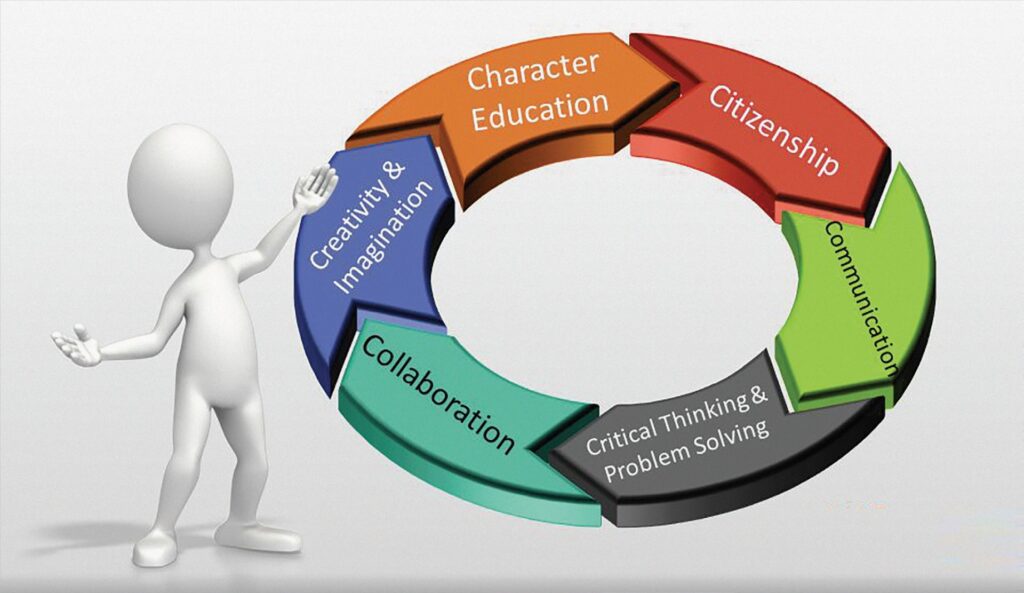Traditional academic knowledge alone is no longer sufficient to prepare students for the challenges and opportunities that lie ahead.

Looking back at my school days, I remember my days revolved around textbooks, memorization, and endless exams. While I did well academically, I couldn’t help but feel there was something missing in the pursuit of education. There was no vision, had an aim with no right direction, and the only thing I knew back then was to pass my grades with flying colors and then start earning after the end of academics.
But then soon I realized, I was not that skillful to dwell in this competitive world, and had to face rejections just due to lack of skills. Then, my major focus was building my skills, and that was when I felt I was facing the real world, improving my skills.
This made me stand out, I could earn after being skillful and I became the preacher of skill mindset, and started working for the company that itself works for skill development.
In today’s rapidly evolving world, education and skills play a pivotal role in shaping the leaders and innovators of tomorrow. Traditional academic knowledge alone is no longer sufficient to prepare students for the challenges and opportunities that lie ahead. Recognizing this, The Kathmandu Metropolitan City (KMC) embarked on an inspiring initiative to integrate skill-based education for grade 9 students in its Bookless Friday Program, revolutionizing the way young minds are nurtured.
 The initiative of KMC to implement a skill-based program for secondary schools was a commendable step towards transforming the education landscape in Nepal. Glocal Academy of Skills intends to develop employability skills that help young people be market-ready. We are dedicated to developing skills among people through the use of various methods, events, courses, and training. We aim to bridge the gap between industry and academia by curating and initiating different demand-oriented learning opportunities. Therefore, Glocal Academy of Skills took a proactive approach to address the demand for essential skills by developing a curated curriculum for ten high-demand courses. These courses span diverse fields including agriculture, urban farming, culinary arts, and fashion design. Our skill-based program has been implemented in over 25 schools within the Kathmandu Valley, aiming to equip young individuals with practical expertise.
The initiative of KMC to implement a skill-based program for secondary schools was a commendable step towards transforming the education landscape in Nepal. Glocal Academy of Skills intends to develop employability skills that help young people be market-ready. We are dedicated to developing skills among people through the use of various methods, events, courses, and training. We aim to bridge the gap between industry and academia by curating and initiating different demand-oriented learning opportunities. Therefore, Glocal Academy of Skills took a proactive approach to address the demand for essential skills by developing a curated curriculum for ten high-demand courses. These courses span diverse fields including agriculture, urban farming, culinary arts, and fashion design. Our skill-based program has been implemented in over 25 schools within the Kathmandu Valley, aiming to equip young individuals with practical expertise.
By imparting these skills, we aim to contribute to various industries by nurturing talented individuals within our country. Our vision is to create a pool of skilled young professionals who can actively support and excel in different sectors of our economy. Additionally, by offering such a diverse range of skill options, the program allowed students to explore and pursue their interests, thereby fostering a sense of passion and dedication toward their chosen fields. A pilot program has achieved its goal & this initiative will now become bigger and better including more students to enhance their skills and be future-ready. By integrating practical education and life-useful skills into the curriculum, the program aimed to prepare students for self-employment in technical fields, promoting economic independence and reducing the overemphasis on theoretical learning. KMC’s progressive move has the potential to revolutionize the education system and empower the next generation of Nepali youth.
Enhancing the Quality of Education
The implementation of the skill-based program represents a fundamental shift in the education paradigm, transforming it from a purely theoretical approach to a more holistic, practical, and skill-oriented model. By embracing a curriculum that incorporates hands-on learning, the program encourages critical thinking, problem-solving, and creativity, which are crucial skills for success in the modern world. This move by the KMC sets a precedent for other educational institutions across Nepal to follow suit and adapt their approach to meet the evolving needs of the job market.
In addition to this, incorporating skill-based education into the mainstream curriculum, students learn the value of hard work, dedication, and craftsmanship, which are essential attributes for personal and societal growth. Initially, introducing skill-based education into the mainstream curriculum was met with challenges in gaining understanding and support from schools, parents, and other stakeholders. Traditional education systems often prioritize academic achievements, leading to uncertainty about the value of skill-focused learning. Convincing schools and parents of the need for skill education required substantial effort. It involved reshaping perceptions and highlighting the long-term benefits of practical skills in a rapidly evolving job market. There were discussions on how skill-based education can foster a deeper sense of appreciation for craftsmanship and hands-on work. Emphasizing that skill-based learning equips students with real-world abilities that are vital for personal growth, employment, and contributing positively to society was crucial.
Now, many schools and parents recognize the value of incorporating skill-based education early on. They appreciate how it instills qualities like perseverance, dedication, and hands-on problem-solving. As a result, there is a growing sense of pride in skilled labor, and the importance of well-rounded education encompassing both academic and practical skills is being acknowledged.
Programs like these should be replicated in various parts of the country. The benefits of skill-based education extend far beyond individual success – they contribute to societal progress and economic growth. By equipping students with practical skills and fostering a strong work ethic, these programs create a foundation for a better future. Replicating these programs across the country can address specific industry needs, creating a diverse skill pool that meets the demands of a rapidly evolving job market. By preparing individuals with both academic knowledge and practical skills, these initiatives contribute to a well-rounded, capable, and adaptable workforce. Skill-based education has the potential to unlock the full potential of Nepali youth, making them not only competent professionals but also responsible and empowered citizens of tomorrow.
Nepal needs to nurture a generation of young individuals who are not only academically proficient but also armed with the practical skills and confidence needed to navigate the challenges of this ever-evolving world. This transformative approach to education holds the promise of shaping a brighter, more prosperous future for our country.
Glocal Pvt. Ltd. and Glocal Academy of Skills have embarked on a mission to propel this empowerment. The focus is not just on teaching skills, but on delivering them effectively and fostering an environment where students can thrive. Through meticulous curriculum design and innovative teaching methods, Glocal has successfully bridged the gap between theoretical knowledge and practical application. This approach has ensured that students not only grasp the concepts but can also apply them confidently in real-world scenarios. By equipping them with skills that will make them empowered, Glocal has laid the foundation for a community of empowered individuals. These individuals possess the ability to explore their passions, collaborate, and innovate. This collective impact has the potential to reshape the landscape of education in Nepal. As we look ahead, the vision extends beyond classroom walls. It envisions a nation where every student has the opportunity to uncover their potential, and where skill-based education is the fundamental pillar of learning. The journey undertaken by Glocal is not just about teaching courses; it is about nurturing a skillful mindset in Youths. It’s about empowering the youth of Nepal to become active contributors to their society, armed with the skills and confidence to create a positive impact, both locally and globally.
Pyakurel is the Corporate Manager at Glocal Pvt. Ltd.


